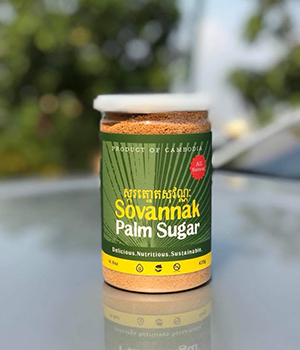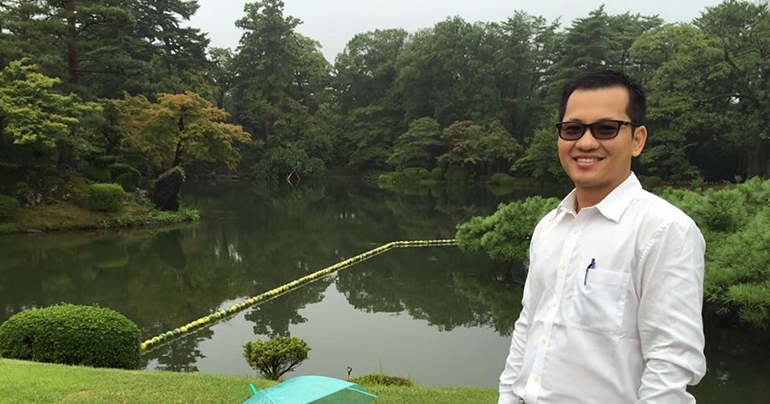Cambodia is famous for producing palm sugar. Juice is collected from the flowers of palm sugar trees, which is then boiled to make palm sugar, often into tablets, where they are then used in traditional Khmer cooking. Creating palm sugar also provides a livelihood for many Cambodians. But the traditional method of creating palm sugar, which involves cooking it over a stove powered by a wood fire, comes with negative side effects. When done on a large scale, this method contributes to deforestation in a country facing the increasing loss of its forests.

Narein Sourn, who runs social enterprise Sovannak Palm Sugar, says he has the answer. According to him, the farmers who produce his palm sugar use a specially designed stove that could reduce the amount of wood burnt by up to 30%.
“I want to continue to help farmers by selling their product to the market and to continue to introduce the environmental-friendly way,” he says. The company’s website reports that each kilogram of its palm sugar uses two kilograms less firewood than the traditional way of production.
In addition to addressing environmental challenges of traditional palm sugar production, Sovannak Palm Sugar seeks to enrich farmers and standardise their products so that it can be exported abroad.
Sourn recounts the problems of unregulated production: “Until now, they produced palm sugar at their households, individually. We see that that way has a lot of high risk in hygiene control,” he says. “We focus on [the] quality of the sugar, because we care about the farmers, our consumers, everybody – I always say we need to grow together and be happy together.”
Sovannak Palm Sugar built a production centre, placing as many stoves there as farmers who agree to abide by certain production standards. Sourn says the facility includes not only the stoves, but also drying tools, cooking tools, an area to dry the sugar, hand washing materials and anything else needed for production. The farmers only have to bring their palm sugar juice and firewood.
When I proposed this idea, all the farmers didn’t like it … But I explained to them, it’s not for the company alone. It’s for them as well, because if they produce good sugar, good products, then it’s good for the customer and will build a good image, and it’s good for their business
Narein Sourn of social enterprise Sovannak Palm Sugar
“Here, we have a supervisor to go around and assist [the farmers] and guide them [in how to] to follow a hygienic way. They have to wear a hat and they have to wear gloves when sifting, and they have to wear a mask. They have to always wash their hands,” Sourn says.
“When I [first] proposed this idea, all the farmers didn’t like it. They said they had many complaints. Who will take care of their children at home? Who will cook the food? Who will wash out the kettles…many things. But I explained to them, it’s not for the company alone. It’s for them as well, because if they produce good sugar, good products, then it’s good for the customer and will build a good image, and it’s good for their business,” he adds.
According to Sourn, the farmers are also often exploited by middlemen who will buy the palm sugar for the cheapest prices possible from farmers who are desperate to sell their product. The middlemen buy the palm sugar for higher prices at the beginning of the season, but when the peak harvest season arrives they buy it for very cheap from the farmers who need to sell their palm sugar in order to cover some expenses like materials and firewood.
“It’s not fair to the farmers. That’s why when I started this at the beginning of the season we negotiated with farmers to one fixed price. They are happy, we are happy…so the price will be fixed for the whole season. And the year after we negotiate again. If we are doing well and our business is doing well, we can see if we can increase [the price] more. [In] my experience we have been increasing [the price] from 2013 until now…because we want to give value to their work and their effort to produce this product,” says Sourn.
“If you look at farmers now, at their livelihood, it’s improving…Now during the production, working, they are happy. And they receive more income, so they are able to support their children going to school. They are able to buy new things. Like some of my farmers, they could buy a new motorbike and fix their house. And [it] helps them to pay their debts, because in the countryside almost everybody has a debt.”

Sovannak Palm Sugar got its start under the wing of the French NGO Geres, which invented the low-energy stove. But after creating the stove the organisation realised it needed to buy the farmers’ sugar from them, and then to create a market for it. That’s when Sourn joined Geres in 2010 as a sales coordinator for the sugar.
However, in 2012 Geres decided to end the project. That was when Sourn, who initially had no business experience or training, decided to take over the enterprise. He approached the Geres management, and they decided to hand the business to him.
“I did delivery, collecting sugar from farmers, everything… even cleaning,” Sourn explains.
Then he realised he needed to expand in order to continue to grow the enterprise, so in 2015 he found South Korean investor Hesed Agriculture. Since then business has grown and the enterprise has been able to export its products as far as South Korea.
Sovannak Palm Sugar currently stores its processed sugar in Phnom Penh, but Sourn says that it is planning to build storage facilities in the provinces where it sources its sugar, such as Kampong Chhnang and Kampong Speu. He explains that storing the sugar in those provinces will create more jobs in the villages. Hopefully this will allow young people to stay in their villages, instead of going to the city or to Thailand to find work, he says.
Sourn also hopes that this model will eventually expand to other major Cambodian agricultural products, such as rice. But for now, he is focussing on growing his social enterprise.
“My business plan in the beginning… we wanted to be a leader in the palm sugar business, to supply a leading quality of sugar. For us, the company, we focus more on the quality. We want consumers to have a good product.”
To find out more about Sovannak Palm Sugar visit their website here.


